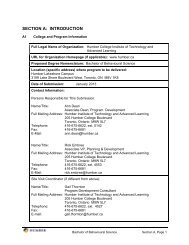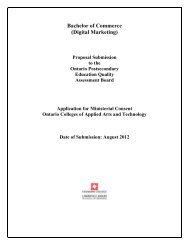- Page 2 and 3:
1. Organization and Program Informa
- Page 4 and 5:
Appendix 7.1.3 Student Feedback Ins
- Page 6 and 7:
Appendix 7.1.3 Student Feedback Ins
- Page 8 and 9:
2. Executive SummaryAppendix 2.1 Ex
- Page 10 and 11:
Generally, this is the same profess
- Page 12 and 13:
4. Program Degree- Level StandardAp
- Page 14 and 15:
Appendix 4.2 Sample of Student Work
- Page 16 and 17:
c. Some professional programs offer
- Page 18:
• Sample of standard application
- Page 23 and 24:
Appendix 5.1.2 Admission Policies a
- Page 25 and 26:
Servicing the ClientWealth Valuatio
- Page 27 and 28:
Insurance Company OperationsInsuran
- Page 29 and 30:
Appendix 5.2.2 Advanced Placement P
- Page 31 and 32:
Samples of guidelines and assessmen
- Page 33 and 34:
• PRIOR LEARNING ASSESSMENT PORTF
- Page 35 and 36:
Your portfolio should contain the f
- Page 37 and 38:
incident from last summer is an exa
- Page 39 and 40:
This material is best presented in
- Page 41 and 42:
5. Guidelines on Curriculum Vitae:E
- Page 43 and 44:
7. Guidelines on Transcripts & Trai
- Page 45 and 46:
Prior Learning Assessment Resources
- Page 47 and 48:
Assessor NameSignatureDateNote: For
- Page 49 and 50:
Section BDoes the applicant’s por
- Page 51 and 52:
2. The portfolio should indicate th
- Page 53 and 54: 4. Has the applicant made any contr
- Page 55 and 56: Appendix 5.2.4 Gap AnalysisNot Appl
- Page 57 and 58: Appendix 5.3 Promotion and Graduati
- Page 59 and 60: Faculty of Graduate StudiesMBA (FIN
- Page 61 and 62: B+ 77-79B 73-76B- 70-72F < 703.33.0
- Page 63 and 64: other assignments should contact Un
- Page 65 and 66: International BusinessQuantitative
- Page 67 and 68: Quantitative Decision MakingManagin
- Page 69 and 70: Appendix 6.1.1. Program Advisory Co
- Page 71 and 72: Dr. Lucia Fanning Tel: 902-494-3666
- Page 73 and 74: Appendix 6.2.1 Professional/Accredi
- Page 75 and 76: Learning Goal 1Our graduates will u
- Page 77 and 78: percentage)All Qualitative CoursesB
- Page 79 and 80: Learning Goal 4*Our graduates will
- Page 81 and 82: Appendix 6.3.2 Course DescriptionsC
- Page 83 and 84: This course is designed to introduc
- Page 85 and 86: Appendix 6.3.3.2 Undergraduate Acad
- Page 87 and 88: Course Selection GuideTentative pro
- Page 89 and 90: H:\CFAME\Courses\MBA(FS)\200930\200
- Page 92 and 93: 7. Program Delivery StandardAppendi
- Page 94 and 95: The Council of Maritime PremiersLe
- Page 96 and 97: For additional copies of this Repor
- Page 98 and 99: Assessment Report of Dalhousie Univ
- Page 100 and 101: 4 Assessment Report of Dalhousie Un
- Page 102 and 103: Professions’ review policy which
- Page 106 and 107: 8 Assessment Report of Dalhousie Un
- Page 108 and 109: 10 Assessment Report of Dalhousie U
- Page 110 and 111: 12 Assessment Report of Dalhousie U
- Page 112 and 113: 14 Assessment Report of Dalhousie U
- Page 114 and 115: 16 Assessment Report of Dalhousie U
- Page 116 and 117: Assessment Report of Dalhousie Univ
- Page 118 and 119: Assessment Report of Dalhousie Univ
- Page 120 and 121: Assessment Report of Dalhousie Univ
- Page 122 and 123: Assessment Report of Dalhousie Univ
- Page 124 and 125: Assessment Report of Dalhousie Univ
- Page 126 and 127: ii. the head of each relevant teach
- Page 128 and 129: Appendix 7.1.3 Student Feedback Ins
- Page 130 and 131: 126
- Page 132 and 133: 4. Did the course material (Lesson
- Page 134 and 135: 5.5.1 Hosting of Research Computer
- Page 136 and 137: (BLS). This ID is vitally important
- Page 138 and 139: Before you begin your course work a
- Page 140 and 141: Part IVCOURSE MANAGEMENT SYSTEM - B
- Page 142 and 143: Contact UsThis section will include
- Page 144 and 145: 140document that you want in a Word
- Page 146 and 147: 1.1.2. Prepare for and present the
- Page 148 and 149: Dalhousie Faculty teaching at a dis
- Page 150 and 151: asynchronously. Group and team comm
- Page 152 and 153: Appendix 8.2 Governance Structure(I
- Page 154 and 155:
Appendix 8.3.1 Coordinated Business
- Page 156 and 157:
University HousingStudent Experienc
- Page 158 and 159:
development. Faculty members who ar
- Page 160 and 161:
8.5 Learning and Information Resour
- Page 162 and 163:
All Dalhousie students get a Dalhou
- Page 164 and 165:
• APA Style (Quick Guide)• MLA
- Page 166 and 167:
SEARCH TOOLSHomePrint PageSearchGui
- Page 168 and 169:
I. B. Statistics LeadershipKey onli
- Page 170 and 171:
Resources for Teaching OnlineThere
- Page 172 and 173:
DalplexEarth Sciences - GISEconomic
- Page 174 and 175:
Carleton Campus - Dentistry Buildin
- Page 176 and 177:
Room 301B: 70 Windows computersLogi
- Page 178 and 179:
Saturday ClosedSunday 12:00 PM - 5:
- Page 180 and 181:
Faculty of Science (Room 2087) - Li
- Page 182 and 183:
Dalhousie University - Faculty of M
- Page 184 and 185:
Appendix 8.5.4 Laboratories/Equipme
- Page 186 and 187:
Appendix 8.7 Support ServicesStuden
- Page 188 and 189:
students and alumni of programs off
- Page 190 and 191:
Appendix 8.8 Policies on FacultyThe
- Page 192 and 193:
appointments are made only by the P
- Page 194 and 195:
to enhance students’ learning and
- Page 196 and 197:
Faculty of Commerce, St. Mary’s U
- Page 198 and 199:
Baltazar, R. (1999). Workers’ Com
- Page 200 and 201:
4. HonorsFellow Chartered Accountan
- Page 202 and 203:
Case Supplement for Accounting Prin
- Page 204 and 205:
“Performance Measurement in the C
- Page 206 and 207:
Chair, Long-term Planning Committee
- Page 208 and 209:
TERESA L. CYRUSDalhousie University
- Page 210 and 211:
BOOK CHAPTERS:“Cross-Border Coope
- Page 212 and 213:
“Is Globalization Good for Women?
- Page 214 and 215:
Canadian Women Economists NetworkPR
- Page 216 and 217:
January, 2008Curriculum VitaeName:A
- Page 218 and 219:
Frequently consulted Canadian Corpo
- Page 220 and 221:
Canada Council, Dalhousie Universit
- Page 222 and 223:
Servicing Graduate Students:2008: P
- Page 224 and 225:
“Risk Management with Duration: P
- Page 226 and 227:
"An Anatomy of Bond Returns," with
- Page 228 and 229:
"An Economic Research on Meat Situa
- Page 230 and 231:
“A Non Optimising Economics and F
- Page 232 and 233:
“Issues Arising in Using Duration
- Page 234 and 235:
Financial Management Association Eu
- Page 236 and 237:
References:European Financial Manag
- Page 238 and 239:
Ambassatours Ltd., Halifax, Nova Sc
- Page 240 and 241:
“Conflict of Interest in Commerci
- Page 242 and 243:
“Conflict of Interest in Commerci
- Page 244 and 245:
- National Research Program in Fina
- Page 246 and 247:
CURRICULUM VITALee LiCURRENT POSITI
- Page 248 and 249:
1. With Qian, G. “Which factors m
- Page 250 and 251:
23. With Ng, P. “Dynamics of expo
- Page 252 and 253:
SERVICEAdministrative2003-2004 Unde
- Page 254 and 255:
Curriculum VitaeLEONARD C. MACLEANE
- Page 256 and 257:
TeachingI have successfully taught
- Page 258 and 259:
MacLean, L., Zhao, Y., Consigli, G.
- Page 260 and 261:
MacLean, L., Zhao, Y., & Ziemba, W.
- Page 262 and 263:
Gordon, P.C., Weldon, K.L., & MacLe
- Page 264 and 265:
“Epidemiological Approach to Avia
- Page 266 and 267:
ResearchFellowshipNational Health a
- Page 268 and 269:
July 2002-PresentAssociate Professo
- Page 270 and 271:
Honours2008 Faculty of Management,
- Page 272 and 273:
Summary of Scholarly ActivityRefere
- Page 274 and 275:
McLarney, C. (2002) “Stepping int
- Page 276 and 277:
McLarney C. (1997) “The Shadows S
- Page 278 and 279:
• McMurry University Presidential
- Page 280 and 281:
In partnership with a colleague, co
- Page 282 and 283:
• Grapple Grommet Corporation [wi
- Page 284 and 285:
Presentations at Professional Meeti
- Page 286 and 287:
• Lehigh University, “The Emerg
- Page 288 and 289:
• $4M contract to deliver advance
- Page 290 and 291:
Other ActivitiesOtherBoard Member -
- Page 292 and 293:
* Sponsored a multi-site employee c
- Page 294 and 295:
Appendix 8.10 Enrolment Projections
- Page 296 and 297:
Government of New BrunswickNew Brun
- Page 298 and 299:
11. Program Evaluation StandardAppe
- Page 300 and 301:
Appendix 12.1.2 Academic Honesty Po
- Page 302 and 303:
The following are some examples of
- Page 304 and 305:
) If the student(s) has a record of
- Page 306 and 307:
are final and binding on all partie
- Page 308 and 309:
7. expulsion from the University;8.
- Page 310 and 311:
For ratification to occur, the deci
- Page 312 and 313:
work, textbook, printed lectures, l
- Page 314 and 315:
Appendix 12.3 Policy on Ethical Res
- Page 316 and 317:
In addition, Departmental Committee
- Page 318 and 319:
general inquiries should be directe
- Page 320 and 321:
13. Student Protection StandardAppe
- Page 322 and 323:
Accounts on the Studley/Carleton Ca
- Page 324 and 325:
Appendix 13.2.2 Fees and ChargesThe
- Page 326 and 327:
Appendix 13.2.4 Withdrawals and Ref
- Page 328 and 329:
The purpose of the FOIPOP Act is tw
- Page 330:
not require that any records actual
















